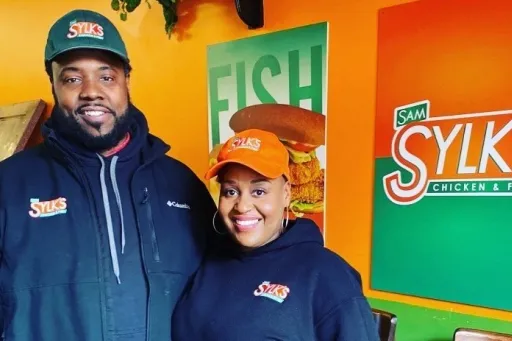With SBA COVID Relief Programs, Restauranteur and Caterer is Able to Stay in Business and Grow

While working as a Chicago-area radio marketer and on-air personality, Sam Brassfield moonlighted with a catering company. He found he enjoyed cooking. “I like to cook, and marketing is something I know, so I thought, I should endorse myself and have a great time catering and serving people,” said Sam. “The two ideas kind of just met, and I thought, let me kick this off, I can give back to my community, and provide jobs for kids.” In 2015, Sam began opening his restaurants, calling them Sam Sylk’s Chicken and Fish, making use of a childhood nickname. As a child, Sam used to pretend to be on the radio and always wore colorful satin hats when he did; friends called him “Sam Sylk” and the name stuck. As Sam’s business grew, he came to own six stores, in Shaker Heights, South Euclid, Euclid, Garfield Heights, Cleveland, and Chicago, with one franchised store in Akron. He operated his stores with the help of his wife, Zenobia Brassfield, who still serves as business manager within the company, and also had over 60 employees. However, when the COVID-19 pandemic hit in 2020, his business was devasted, even though he was able to pivot and provide largely take-out service.
To ensure he could keep staff on his payroll, Sam turned to the SBA for assistance. He took out four SBA-administered Paycheck Protection Program (PPP) loans for his Euclid, Shaker Heights and Garfield Heights stores. “The PPP was a great thing, and I was able to pay employees and pay rent,” Sam said. “The PPP loans helped us get ahead of the game. Because of the pandemic, I didn’t know how things were going to turn out, and the loans really helped us during that uncertainty. I was even able to give employees raises during this time.” In addition to making use of the PPP, Sam later received two SBA COVID-19 Economic Injury Disaster Loans (COVID-19 EIDL) for his business, as well as four SBA EIDL Advances. These loans and advances helped Sam weather the increased costs and supply chain problems that affected his business during the pandemic.
The EIDL loans continue to help Sam with his business. “Really, even now, the cost of goods has gone up tremendously,” said Sam. “There’s a scarcity of goods, too. I often have to locate other vendors who have something left that my regular suppliers no longer have. A box of catfish used to average around $30, and might fluctuate to $40. Now, they say it is $70! So, I call around to get it, or have to decide not sell it. But with my restaurant name including particular items, I must continue to provide it, so it is a challenge.” In addition to using the EIDL loans to help stabilize his business during the pandemic, Sam’s business received four EIDL advances and has used them to make improvements to the restaurants. “They are helping us now,” Sam said. “We have even been able to do different improvements, in our office, providing lockers for employees, and new coolers, which has been a great help.”
